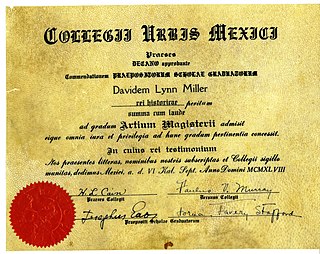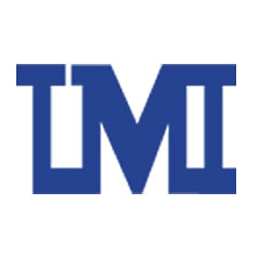
The City and Guilds of London Institute is an educational organisation in the United Kingdom. Founded on 11 November 1878 by the City of London and 16 livery companies – to develop a national system of technical education, the institute has been operating under royal charter (RC117), granted by Queen Victoria, since 1900. The Prince of Wales, later King Edward VII, was appointed the first president of the institute.

A diploma is a document awarded by an educational institution testifying the recipient has graduated by successfully completing their courses of studies. Historically, it has also referred to a charter or official document of diplomacy.
Post-nominal letters, also called post-nominal initials, post-nominal titles, designatory letters or simply post-nominals, are letters placed after a person's name to indicate that the individual holds a position, an academic degree, accreditation, an office, a military decoration, or honour, or is a member of a religious institute or fraternity. An individual may use several different sets of post-nominal letters, but in some contexts it may be customary to limit the number of sets to one or just a few. The order in which post-nominals are listed after a name is based on rules of precedence and what is appropriate for a given situation. Post-nominal letters are one of the main types of name suffix. In contrast, pre-nominal letters precede the name rather than following it, such as addressing a physician or professor as "Dr. Smith".
A graduate diploma is generally a qualification taken after completion of a first degree, although the level of study varies in different countries from being at the same level as the final year of a bachelor's degree to being at a level between a master's degree and a doctorate. In some countries the graduate diploma and postgraduate diploma are synonymous, while in others the postgraduate diploma is a higher qualification.
A postgraduate diploma is a postgraduate qualification awarded after a university degree, which supplements the original degree and awards them with a graduate diploma. Countries that award postgraduate diplomas include but are not limited to Bangladesh, Barbados, Belgium, Brazil, Canada, Chile, Colombia, Germany, Hong Kong, Jamaica, Spain, Kenya, South Africa, Sudan, India, Israel, Ireland, the Netherlands, New Zealand, Nigeria, Republic of Panama the Philippines, Portugal, Russia, Pakistan, Poland, Saudi Arabia, Singapore, Sweden, the United Kingdom, Sri Lanka, Trinidad and Tobago and Zimbabwe. Level of education and recognition differ per issuing country.

Chartered accountants were the first accountants to form a professional accounting body, initially established in Scotland in 1854. The Edinburgh Society of Accountants (1854), the Glasgow Institute of Accountants and Actuaries (1854) and the Aberdeen Society of Accountants (1867) were each granted a royal charter almost from their inception. The title is an internationally recognised professional designation; the certified public accountant designation is generally equivalent to it. Women were able to become chartered accountants only following the Sex Disqualification (Removal) Act 1919 after which, in 1920, Mary Harris Smith was recognised by the Institute of Chartered Accountants in England and Wales and became the first woman chartered accountant in the world.

Founded in 1904, the Association of Chartered Certified Accountants (ACCA) is the global professional accounting body offering the Chartered Certified Accountant qualification (ACCA). It has 240,952 members and 541,930 future members worldwide. ACCA's headquarters are in London with principal administrative office in Glasgow. ACCA works through a network of over 110 offices and centres in 51 countries - with 346 Approved Learning Partners (ALP) and more than 7,600 Approved Employers worldwide, who provide employee development.

The Chartered Governance Institute is a qualifying and membership body for company secretaries and governance professionals that operates in some common law jurisdictions.

The World Maritime University(WMU) in Malmö, Sweden, is a postgraduate maritime university founded within the framework of the International Maritime Organization (IMO), a specialized agency of the United Nations. Established by an IMO Assembly Resolution in 1983, the aim of WMU is to further enhance the objectives and goals of IMO and IMO member States around the world through education, research, and capacity building.
Following is a partial list of professional certifications in financial services, with an overview of the educational and continuing requirements for each; see Professional certification § Accountancy, auditing and finance and Category:Professional certification in finance for all articles. As the field of finance has increased in complexity in recent years, the number of available designations has grown, and, correspondingly, some will have more recognition than others. Note that in the US, many state securities and insurance regulators do not allow financial professionals to use a designation — in particular a "senior" designation — unless it has been accredited by either the American National Standards Institute or the National Commission for Certifying Agencies.
The Institute of Consulting (IC) is the professional body for consultants and business advisers in the United Kingdom. It replaced the former Institute of Business Consulting (IBC) in January 2011, which was itself formed as the merger of two predecessor bodies, the Institute of Management Consultants (IMC) and the Institute of Business Advisors (IBA). The Institute of Consulting is an organisation within the Chartered Management Institute (CMI).

Uganda Management Institute (UMI) is a government-owned national center for training, research, and consultancy in the field of management and administration in Uganda. It is one of the nine public universities and degree-awarding institutions in the country outside the military.
The RMIT School of Accounting is an Australian university business school located in Melbourne, Victoria, which is responsible for undergraduate and postgraduate education and research in accounting at RMIT University. The School was established in 1943 and its name was changed to the School of Accountancy in 1948.
ABRS Management and Technology Institute is a Hong Kong based continuing education and training institute established in 1990. and registered with the Education Bureau since 1994.

The IMM Graduate School is a privately owned educational institution and is part of the UXi Education group. The IMM Graduate School offers degrees, diplomas and certificates in marketing, marketing management and supply chain management.
The Australian College of Applied Professions (ACAP) is a registered training organisation and higher education provider that specialises in teaching Undergraduate and Postgraduate courses in psychology, counselling, social work, criminology, coaching and management. ACAP is accredited by the Psychotherapy and Counselling Federation of Australia (PACFA), the Australian Psychology Accreditation Council (APAC).

Jansen Newman Institute is an Australian private college that offers both tertiary education and vocational education and training in counselling, psychotherapy and community services.

The Australian Institute of Management Education and Training Pty Ltd, commonly known as AIM or AIMET, is an Australian education provider. Its courses include business, management and leadership. AIM offers short courses, nationally accredited qualifications, post-graduate higher education and corporate solutions. Campuses and offices are located in New South Wales, Australian Capital Territory, Queensland, South Australia and Victoria.
Post-secondary qualifications are qualifications typically studied for after successful completion of secondary school. In Sri Lanka, this is usually after successful completion of the General Certificate of Education. A variety of different post-secondary qualifications are offered in Sri Lanka.
Team University (TU) is a private, co-educational Ugandan university in the Buganda Region of Uganda. It is accredited as a "private university", by the Uganda National Council for Higher Education (UNCHE).










